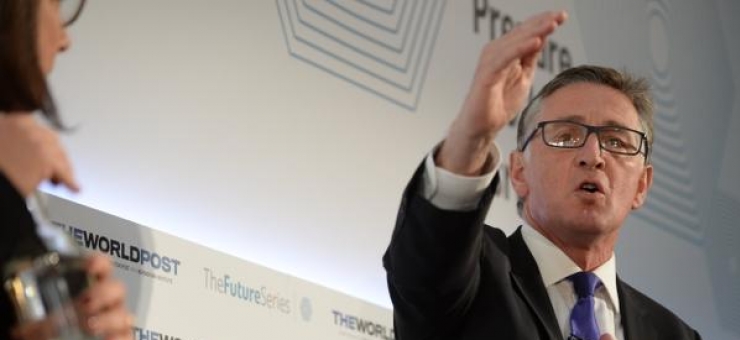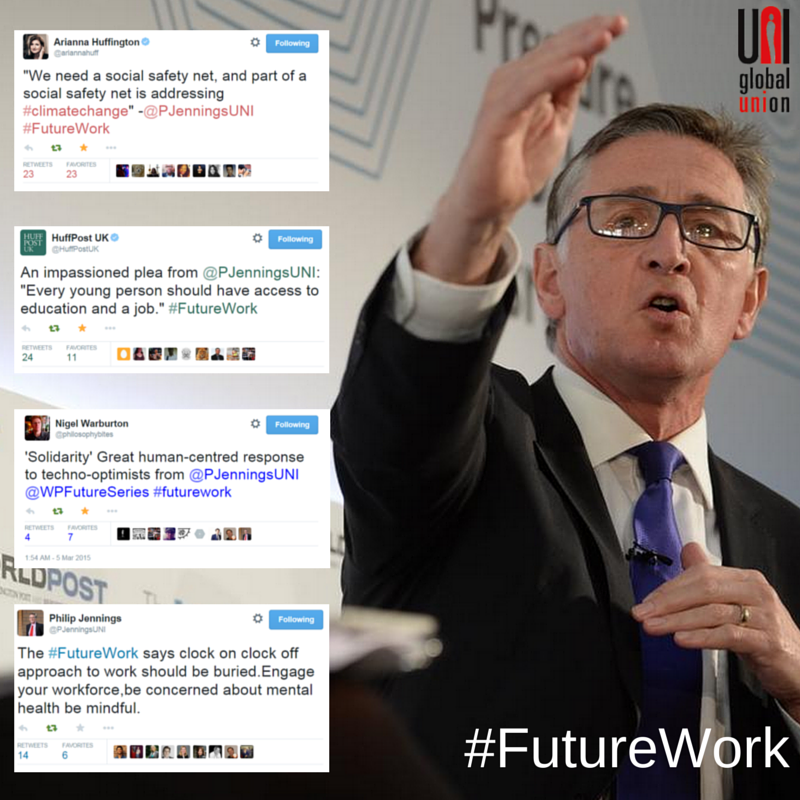News
Philip Jennings: Influencing thought leaders at Future of Work conference

At a high level conference on the Future of Work in London today, UNI Global Union General Secretary Philip Jennings said the key word missing on the global debate on the jobs revolution was “solidarity”.
Jennings was speaking at the inaugural event of the WorldPost Future Series held at Lancaster House. He urged leaders not to try and whitewash over the seriousness of the jobs challenge.

“Over 60 million jobs have been lost since the beginning of the financial crisis in 2008. With the addition of new labour market entrants over the next five years, 280 million more jobs need to be created by 2019. Half the world’s workforce are employed in precarious work and one and three jobs pay less than $1.25 per day. To just maintain the status quo 1.8 billion jobs must be created by 2030,” Jennings said.
“We are seeing levels of inequality in income distribution back to the scale of the 1920s. We are living through a boom period but only for the 1%. There is a word missing in the world of tomorrow debate – it’s “solidarity”.
He said there were solutions, “We need a new social safety net which has new component parts from basic income guarantees, through lifelong learning, to climate change measures. A safety net requires a reconnection to the idea of an employment relationship, we see too much abuse in changing from a responsibility model to one of independent contractors which shatters trust and feeds insecurity.”
Income distribution was the key, he explained, “We have to lift the wage share in wealth produced, pursue living wage guarantees, gender pay equality, and limits on CEO pay. If we lift wage share and public investment we can create millions of jobs. If we refit to green our economies we can create millions more jobs.”
Tackling job polarization was also fundamental to inclusive growth.
“Quality jobs, fair labour standards, and collective bargaining are all at the root of fair, sustainable growth. We must lift standards in those sectors which are considered low skill. At UNI, which is the global union for the services sectors, we know that fair labour standards, backed by strong unions with negotiating power creates decent work. We’ve seen it in cleaning and security.”
Jennings said the workplace would have to become more democractic to cope with the new era of work, “People will demand a bigger say at the workplace on training, work organisation, health, and stress management. The old clocking in mentality must be replaced by shorter, productive hours with constant access to training and education. Services jobs growth is key. Looking forward, jobs will grow in the social economy in the non-profit sector, in care and communities.”
Underlying all of this progress is an urgent need for change to a new responsible business model, not built around short-term gains for shareholders but equality and sustainability for all.
“We need ethical supply chains where the new benchmark will be the Bangladesh Accord, brokered by UNI and IndustriALL global unions. After all 80% of world trade is supply chain linked. It’s all about inclusive growth, what we at UNI call “Including You”.
Finally Jennings said the evolution of unions would help to drive this sustainable growth.
“Unions are evolving, we have more freelancers, more services, more professionals, and new demands for union services. And we are able to mobilize: last week a million voices pushed Benetton to contribute to the Rana Plaza fund. We are globalising our influence. Global Unions are a power.”
Jennings concluded, “We remember the quote from Jean Jaures – ‘We take from the alters of the past the fire not the ashes’. We have the fire, we are integral to finding solutions. There is a mood change – inequality downsides are becoming mainstream. Even the IMF has concluded if you weaken unions you aggravate inequality, handicap your economy. We have a future.”
Follow the conference on Twitter here : #FutureWork
- See more at: http://www.unigeneralsecretary.org/?p=403#sthash.e0GWNqQE.dpuf

